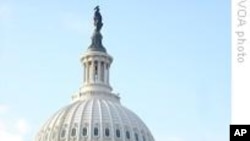<!-- IMAGE -->
The stage is set for a historic debate in the U.S. Congress on legislation crafted by majority Democrats to reform the U.S. health care system. The debate expected in a special Saturday session in the House of Representatives comes amid growing concerns that the U.S. Senate will be unable to bring a measure to a vote before the end of the year.
With the end of his first year in office less than three months away, President Obama hopes both chambers of Congress can pass legislation, work out any remaining differences, and get a final bill to his desk before the year is out.
He could then move into 2010 - which is a congressional mid-term election year - able to point to what could be the biggest victory he may achieve, whether he spends four years or eight years in office.
After the required 72 hours for minority Republicans to review it, Democrats will bring to the floor a massive nearly 2,000 page bill aiming to provide health insurance to about 96 percent of Americans eligible for it.
In addition to a government-managed insurance option, the measure would create exchanges providing Americans with insurance choices, and prohibit insurance companies from refusing coverage to people with pre-existing medical problems.
It would be paid for by increasing taxes on higher income Americans, and reducing payments that health insurance companies, hospitals and other providers currently receive through the government-run Medicare program.
Republicans assail the measure as a government takeover of the health care system, taking aim at its huge size and what they assert will be long-term additions to the federal deficit.
Steve Scalise is a Republican from Louisiana:
"This 1,990 page bill that has just been filed a few days ago by the [Democratic House] Speaker adds up to over $1 trillion of new spending and if you break this spending down, how much is this going to cost - $530 million per page," said Steve Scalise.
The legislation has not pleased all Democrats, particularly moderates and conservatives whose votes will be crucial, and progressives who urged even stronger steps toward true universal government-run health care.
But House Speaker Nancy Pelosi's decision to move to a vote is an indication she is confident that not too many Democrats will vote against their party and that she will achieve the required 218 votes needed for approval.
On the House floor on Wednesday, New York Democrat Eliot Engel, who had pushed for a stronger bill, responded to Republican criticisms.
"We're going to make it so that we have affordable health care for all for the American people," said Eliot Engel. "The American people should reject the lies and scares and unfair tactics. We're going to have health care for all and it is going to be good for the American people."
Often drowned out in the debate is the fact that while Americans would be required to purchase some form of health insurance, little would change for a majority of those already covered through employer plans.
Republicans continue to assert that the Democratic bill would lead to health care rationing, threaten older Americans with loss of care, and result in millions of lost jobs.
On the House floor, Michele Bachmann, a Minnesota Republican pointed to a Wall Street Journal editorial blasting the Democrat's bill, while Massachusetts Democrat Niki Tsongas responded to Republican claims that President Obama aims to socialize the medical system.
BACHMANN: "There is one thing that we need to know about this health care bill that Speaker Pelosi is putting before the American people, it is what President Barack Obama's economic adviser Christina Romer said. If this bill passes it will mean 5.5 million job losses.'
TSONGAS: "Attempts to reform our health care system in the past have failed because of false claims that this is socialized medicine. And of course these are the same arguments that the bill's opponents are making today. But it won't work this time, because the American people are tired of unaffordable premiums, of unfairly losing coverage and the fine print [by insurance companies] that prevents them from getting the care they need."
Though Democrats initially estimated the cost over 10 years at $894 billion, below a goal set by President Obama, the estimate by the bipartisan Congressional Budget Office (CBO) is just over $1 trillion.
That provided additional ammunition for Republicans who will have one opportunity to offer a substitute for the Democrat's legislation.
Republicans would not require Americans to obtain health insurance or companies to offer it, would not provide subsidies, and not prohibit companies from denying coverage.
Worrying for the White House is the possibility that the U.S. Senate may fail to bring up a health care reform bill in coming weeks.
<!-- IMAGE -->
Democratic Senate Majority Leader Harry Reid declined to state unequivocally that a measure would come to the floor, adding that a good bill rather than speed is the goal.
"They want, the Democrats, to do this the right way, not the fast way," said Harry Reid.
Democratic congressional leaders are assessing losses by their two state governors in off-year elections on Tuesday in Virginia and New Jersey. They are also concern about the political impact that failure to pass health care this year could have in 2010, when congressional mid-term elections will be held. But speaking to reporters on Wednesday, House Speaker Nancy Pelosi dismissed a suggestion that election losses would make it harder for Democrats to achieve President Obama's health care goals.




